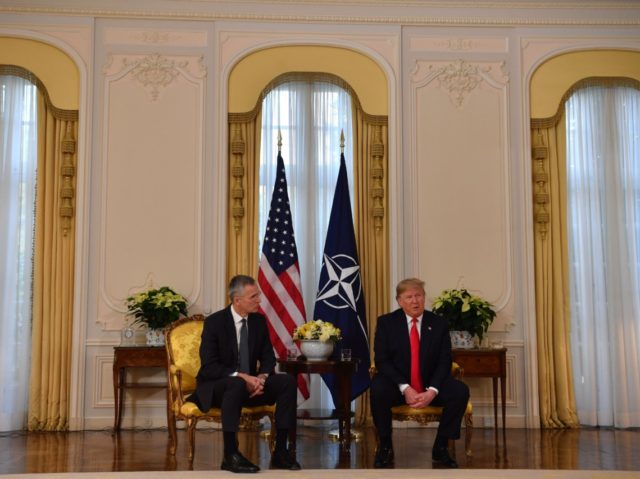President Trump answered the speculation over whether he would get involved in the UK general election campaign during his visit to London this week, praising Brexit and Boris Johnson but insisting he would stay out of the vote.
The United Kingdom is just nine days away from voting in a new government in an election that was called after the NATO 70th anniversary conference was called in London. President Trump has frequently shared his views on British politics on previous visits, but his remarks Tuesday morning demonstrated he would not be drawn into attempting to influence the Uk vote.
Asked why he wouldn’t be getting involved during a NATO press conference Tuesday morning, the President said: “Because I don’t want to complicate it. Look, I’ve won a lot of elections for a lot of people. If you look just over the last few months, two elections in North Carolina I won. I helped the governor of Kentucky… but this is a different country.
“In Germany they liked Obama. The reason they liked Obama was because he gave the ship away, he allowed them to take everything. He gave them things that I wouldn’t do. I love Germany, I love [the United Kingdom], I love a lot of countries.
“But I’m representing the U.S. So they may not like me because I’m representing us, and I’m representing strong… I’ll stay out of the election.”
Despite the vow, President Trump emphasised his personal support for present UK Prime Minister Boris Johnson. He continued: “You know I was a fan of Brexit, I called it. The day before, I was opening up Turnberry… they asked me whether Brexit would happen, I said yes, they smiled and they laughed. I said yes. The next day they had the election, and I was right. But I stay out of it. Boris is very capable and I think he’ll do a good job.”
The President was also challenged on whether he’d be able to work with Boris Johnson’s major challenger Jeremy Corbyn should he pull off an electoral surprise and win the election. President Trump was upbeat, and cited his record on NATO as showing he had a good record of working well with other world leaders. President Trump said of Corbyn: “I can work with anyone, I’m a very easy person to work with.
“You wouldn’t believe it. Look at this gentleman, when I came in I was angry at NATO. And now I’ve raised $130bn annually, a tremendous amount of money. And yet you still have many delinquent members]… who are not paid up in full.”
Trump’s reticence to get involved in the British election contrasts with other U.S. figures including Barrack Obama and Hillary Clinton, who have shown comparative enthusiasm to speak out on UK votes.
Perhaps the most infamous instance was President Obama’s “back of the queue” comments during the Brexit referendum, intended as part of the campaign to frighten the British people into voting to remain in the European Union and, it later transpired, orchestrated by Prime Minister David Cameron. The comments were seen to have seriously backfired.
Hillary Clinton, on the other hand, has shown no reluctance to speak out on UK politics. While President Trump has supported the British people expressing through a referendum their preference on a future relationship with the European Union, his one-time political opponent has spoken out on several occasions to say that Britain was wrong to make that choice.
Last month, Mrs Clinton spoke in London and remarked that Brexit was a “problem” and that the United Kingdom was on “the path [to] authoritarianism, that is the path [to] fascism.” The failed Presidential candidate had previously said that Brexit was undermining peace, and that Brexit voters had been conned into voting for a “horrible lie“.
The comments from President Trump follow remarks by UK Prime Minister Boris Johnson and Brexit leader Nigel Farage, who both separately expressed their expectations ahead of President Trump’s arrival Monday that he would choose to steer clear of the election. Asked by Breitbart London whether he would be meeting the President this week, Mr Farage said he would not, but that the arrival of the President during the NATO summit would bring defence to the fore of the national conversation.
Mr Farage said: “No, no plans to see the President. I’m on the campaign trail and he will obviously do his utmost to appear to be neutral through all of this. But it does raise some big questions because he’s coming for the NATO summit, and we have just seen a Conservative manifesto which in terms of defence is promising almost nothing other than more cutbacks. It is even pretty questionable whether the UK is going to stick to the two per cent needed to be a valid part of NATO.
“We have the rapid development of the European defence union and intelligence-sharing — you’ve got the Five Eyes intelligence-sharing community, NATO, and a European Union which I beleive would be happy to see NATO destroyed. And I think in the middle of all this next week, Boris Johnson may need to stand up and start saying where he stands on all of this and with his Brexit, are we leaving the European defence union or not?”

COMMENTS
Please let us know if you're having issues with commenting.